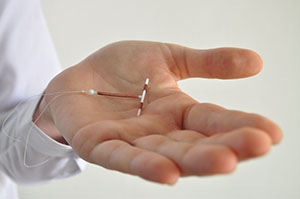
Author: David Turok

A new study from the collaboration between the University’s family planning program in the Department of Obstetrics and Gynecology and Planned Parenthood Association of Utah, found that women seeking short-term emergency contraception benefit from a variety of options for long-term birth control.
Previous work has shown that women seeking emergency contraception have a particularly high risk of having future unwanted pregnancies. Helping these women access long-term contraception may reduce this burden.
Women are typically given two choices when seeking emergency contraception: the morning-after pill, which provides no protection against future unintended pregnancies, or the copper intrauterine device (IUD), which serves as both a short- and long-term contraceptive. The copper IUD can have negative side-effects, like heavier periods, and isn’t very popular. David Turok, MD, MPH and his team gave women a third option: take the morning-after pill and also receive the long-term hormonal IUD.

The study found that women are more accepting of long-term contraception when given more options. This research formed the foundation of an NIH sponsored randomized study which will definitely compare the copper and hormonal IUDs for emergency contraception.